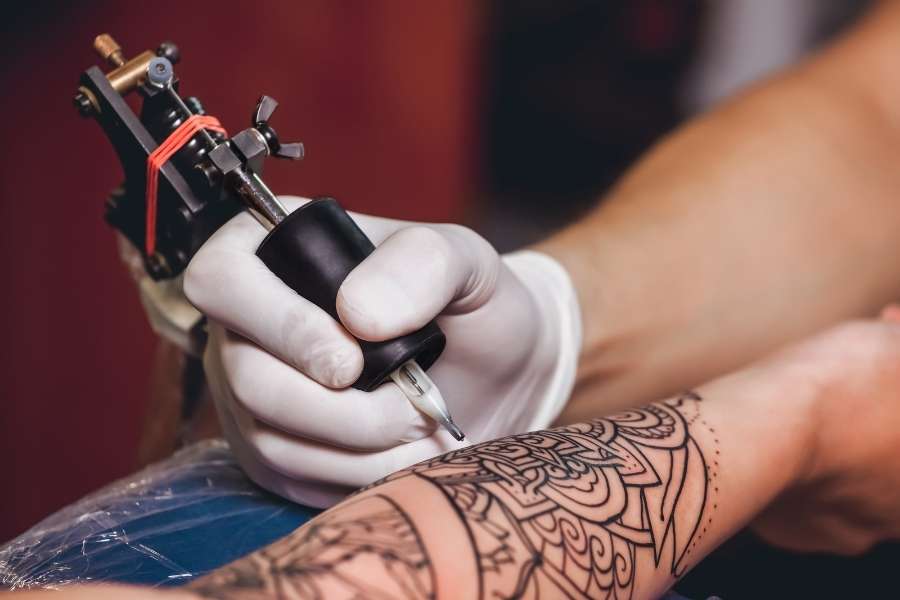Tattoos are becoming increasingly popular, with more and more people choosing to mark their skin with symbols, text, and special markings that often have deep significance and personal value to each individual.
They can be a wonderful way to honour loved ones or mark events in one’s life, but what do you do if you have a skin condition like eczema? Well, the good news is that it’s still perfectly possible for people with eczema to get a tattoo, but you need to be a little more careful than the average person.
What to do before getting a tattoo?
There are plenty of people out there who have eczema and still have plenty of tattoos all over their bodies, so it’s clear that tattoos and eczema can co-exist quite peacefully, but you’ll need to put in some time and effort to prepare properly and stay safe before getting any ink yourself.
Talk to your tattoo artist
A good way to start off when looking for a tattoo with eczema is to speak with a trusted tattoo artist about the matter. Tattoo artists deal with all kinds of clients and skin types, so they should have valuable information and insight to share with you on the subject.
Talk to your doctor
It’s also wise to consult with your doctor before booking any kind of tattoo as well. Your doctor or dermatologist will understand your condition better than anyone and be able to provide you with the medical information and advice you need to make the right call for your skin.
Research different types of tattoo ink for sensitive skin
You can also carry out some research yourself, and there are plenty of guides, videos, and explanatory, evidence-based articles online on the matter of tattoos for people with eczema or those with sensitive skin and other conditions.
One of the main risks of getting a tattoo with eczema is that your skin might react badly to the type of ink used by the tattoo artist. Fortunately, there are safer varieties of ink out there, and you can find out more about them online.
What are the risks of getting a tattoo if you have eczema?
It’s important to note that even though it’s possible to safely get a tattoo with eczema, there are still some risks associated with this process. Here are just a few symptoms that may arise if you get a tattoo with eczema and a reaction occurs:
- Patchy skin – In some cases, people with eczema who get tattoos may find that their skin becomes patchy and inflamed afterward.
- Keloids – Keloids are firm lumps and bumps that can appear on the skin after tattoos and piercings. They aren’t dangerous but can be unpleasant to deal with.
- Itchiness or redness – It’s also possible that the skin around the tattoo might become itchy and red, which are common symptoms for people dealing with eczema flare-ups.
How do I get a safe tattoo with eczema?
There’s no 100% guaranteed way to get a tattoo safely if you have eczema, but even for people without eczema, there are always risks associated with this process as it’s impossible to know how the skin might react. Fortunately, in the vast majority of cases where people have carried out proper research and spoken with the right tattoo artist, there aren’t any major problems to worry about.
In general, one of the safest methods is to find a tattoo artist who will make use of special ink that has been designed for sensitive skin. This will really reduce your risks of any flare-ups, so be sure to ask your artist if they have this ink or ask them to order some for you. You can also read reviews and testimonials to find the best and most trusted artists near you.
How do you care for a tattoo if you have eczema?
Usually, the artist will bandage the tattoo, you’ll need to remove the bandage as directed (typically after 24 hours). The tattoo should be cleaned gently with a wet cloth, rather than submerged in water, and you should also use a special ointment to help the skin heal. Again, the artist should provide this ointment.
You should also make use of a gentle moisturizer to speed up the healing process, and those who experience any eczema-related symptoms like redness and itchiness can use products like hydrocortisone cream, oatmeal baths, cocoa butter, and prescription ointments.
When you should see a doctor after getting a tattoo
In most cases, you shouldn’t need to see a doctor and can contact your tattoo artist for advice and aftercare assistance if you experience minor issues like itchiness or redness. However, if you develop any of the following symptoms, be sure to speak with a doctor:
- Discharge from the tattooed skin
- Severe swelling of the skin
- Large patches of red, inflamed skin around the tattoo
- A fever
Overall, having eczema shouldn’t stop you from getting a tattoo if you really want one, but you do need to put in a little more effort and attention to make sure you stay safe.















